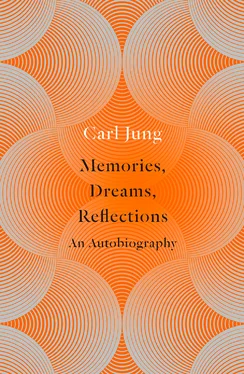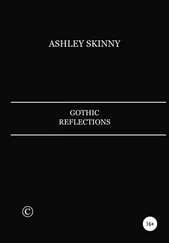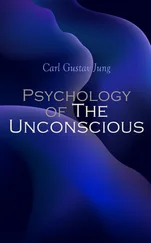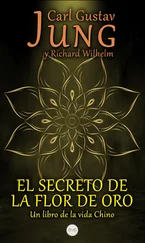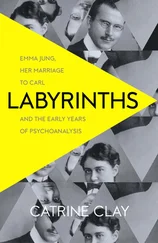From the beginning I had a sense of destiny, as though my life was assigned to me by fate and had to be fulfilled. This gave me an inner security, and, though I could never prove it to myself, it proved itself to me. I did not have this certainty, it had me. Nobody could rob me of the conviction that it was enjoined upon me to do what God wanted and not what I wanted. That gave me the strength to go my own way. Often I had the feeling that in all decisive matters I was no longer among men, but was alone with God. And when I was “there,” where I was no longer alone, I was outside time; I belonged to the centuries; and He who then gave answer was He who had always been, who had been before my birth. He who always is was there. These talks with the “Other” were my profoundest experiences: on the one hand a bloody struggle, on the other supreme ecstasy.
Naturally, I could not talk with anyone about these things. I knew of no one to whom I might have communicated them except, possibly, my mother. She seemed to think along somewhat similar lines as myself. But I soon noticed that in conversation she was not adequate for me. Her attitude towards me was above all one of admiration, and that was not good for me. And so I remained alone with my thoughts. On the whole, I liked that best, I played alone, daydreamed or strolled in the woods alone, and had a secret world of my own.
My mother was a very good mother to me. She had a hearty animal warmth, cooked wonderfully, and was most companionable and pleasant. She was very stout, and a ready listener. She also liked to talk, and her chatter was like the gay splashing of a fountain. She had a decided literary gift, as well as taste and depth. But this quality never properly emerged; it remained hidden beneath the semblance of a kindly, fat old woman, extremely hospitable, and possessor of a great sense of humour. She held all the conventional opinions a person was obliged to have, but then her unconscious personality would suddenly put in an appearance. That personality was unexpectedly powerful: a sombre, imposing figure possessed of unassailable authority — and no bones about it. I was sure that she consisted of two personalities, one innocuous and human, the other uncanny. This other emerged only now and then, but each time it was unexpected and frightening. She would then speak as if talking to herself, but what she said was aimed at me and usually struck to the core of my being, so that I was stunned into silence.
The first time I remember this happening was when I was about six years old. At that time we had neighbours who were fairly well off. They had three children, the eldest a boy of about my own age, and two younger sisters. They were city folk who, especially on Sundays, dressed their children in a manner that seemed ridiculous to me — patent-leather shoes, white frills, little white gloves. Even on week-days the children were scrubbed and combed. They had fancy manners and anxiously kept their distance from the tough, rude boy with tattered trousers, holes in his shoes, and dirty hands. My mother annoyed me no end with her comparisons and admonishments: “Now look at those nice children, so well brought up and polite, but you behave like a little lout.” Such exhortations humiliated me, and I decided to give the boy a hiding — which I did. His mother was furious, hastened to mine and made a great to-do over my act of violence. My mother was properly horrified and gave me a lecture, spiced with tears, longer and more passionate than anything I had ever heard from her before. I had not been conscious of any fault; on the contrary, I was feeling pretty pleased with myself, for it seemed to me that I had somehow made amends for the incongruous presence of this stranger in our village. Deeply awed by my mother’s excitement, I withdrew penitently to my table behind our old spinet and began playing with my bricks. For some time there was silence in the room. My mother had taken her usual seat by the window, and was knitting. Then I heard her muttering to herself, and from occasional words that I picked up I gathered that she was thinking about the incident, but was now taking another view of it. Suddenly she said aloud, “Of course, one should never have kept a litter like that!” I realised at once that she was talking about those “dressed-up monkeys.” Her favourite brother was a hunter who kept dogs and was always talking about dog breeding, mongrels, purebreds, and litters. To my relief I realised that she too regarded those odious children as inferior whelps, and that her scolding therefore need not be taken at face value. But I also knew, even at that age, that I must keep perfectly still and not come out triumphantly with: “You see, you think as I do!” She would have repudiated the idea indignantly: “You horrid boy, how dare you pretend such a thing about your mother!” I conclude from this that I must already have had earlier experiences of a similar nature which I have forgotten.
I tell this story because at the time of my growing religious scepticism there was another instance which threw light on my mother’s twofold nature. At table one day the talk turned on the dullness of the tunes of certain hymns. A possible revision of the hymnal was mentioned. At that my mother murmured, “ O du Liebe meiner Liebe, du verwünschte 2Seligkeit” (O thou love of my love, thou accursed bliss). As in the past I pretended that I had not heard and was careful not to cry out in glee, in spite of my feeling of triumph.
There was an enormous difference between my mother’s two personalities. That was why as a child I often had anxiety dreams about her. By day she was a loving mother, but at night she seemed uncanny. Then she was like one of those seers who is at the same time a strange animal, like a priestess in a bear’s cave. Archaic and ruthless; ruthless as truth and nature. At such moments she was the embodiment of what I have called the “natural mind.” 3
I too have this archaic nature, and in me it is linked with the gift — not always pleasant — of seeing people and things as they are. I can let myself be deceived from here to Tipperary when I don’t want to recognise something, and yet at bottom I know quite well how matters really stand. In this I am like a dog — he can be tricked, but he always smells it out in the end. This “insight” is based on instinct, or on a “ participation mystique ” with others. It is as if the “eyes of the background” do the seeing in an impersonal act of perception.
This was something I did not realise until much later, when some very strange things happened to me. For instance, there was the time when I recounted the life story of a man without knowing him. It was at the wedding of a friend of my wife’s; the bride and her family were all entirely unknown to me. During the meal I was sitting opposite a middle-aged gentleman with a long, handsome beard, who had been introduced to me as a barrister. We were having an animated conversation about criminal psychology. In order to answer a particular question of his, I made up a story to illustrate it, embellishing it with all sorts of details. While I was telling my story, I noticed that a quite different expression came over the man’s face, and a silence fell on the table. Very much abashed, I stopped speaking. Thank heavens we were already at the dessert, so I soon stood up and went into the lounge of the hotel. There I withdrew into a corner, lit a cigar, and tried to think over the situation. At this moment one of the other guests who had been sitting at my table came over and asked reproachfully, “How did you ever come to commit such a frightful indiscretion?” “Indiscretion?” “Why yes, that story you told.” “But I made it all up!”
To my amazement and horror it turned out that I had told the story of the man opposite me, exactly and in all its details. I also discovered, at this moment, that I could no longer remember a single word of the story — even to this day I have been unable to recall it. In his Selbstschau Zschokke 4describes a similar incident: how once, in an inn, he was able to unmask an unknown young man as a thief, because he had seen the theft being committed before his inner eye.
Читать дальше
